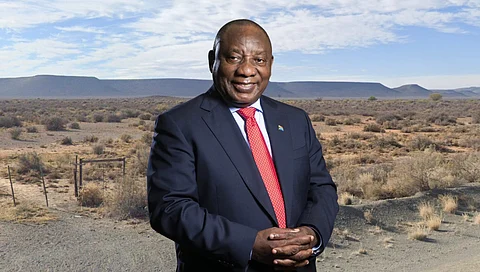

South African president Cyril Ramaphosa has signed a controversial land expropriation bill into law.
The law, which replaces the pre-democratic Expropriation Act of 1975, allows the government to seize land in the name of "public interest."
The state has always had the ability to expropriate land, however the reasons for doing so have changed since 1994 with the advent of democracy in the nation.
Per Section 25 of the Constitution, public interest includes not just public services such as transit and hospitals, but "the nation's commitment to land reform, and to reforms to bring about equitable access to all South Africa's natural resources."
In a press release, the president's office explained that the law will not allow the government to expropriate property "arbitrarily or for a purpose other than a public purpose or in the public interest."
The expropriation authority will be required to enter into negotiations with property owners, and provide "just and equitable compensation."
There are some scenarios, however, where the government is not obligated to do so. In an interview with 702's Stephen Grootes, President's Land Reform Advisory Panel member Bulelwa Mabasa, who also serves as head of land reform at Werksmans, explained that these include abandoned land where the owner is not traceable, as well as land which is solely being held to increase its value. State-held land that is not being used will also be subject to expropriation without compensation.
The African National Congress, which was the ruling party when the bill was first introduced during the last parliament, celebrated the as a "progressive and transformative tool to advance land reform in ways that enable inclusive economic growth and social cohesion."
"This is a direct response to the needs of millions of South Africans who have been excluded from land ownership and access to natural resources for far too long," the party continued. "This law is a critical step towards fulfilling the vision articulated in the Freedom Charter, which declared, 'The land shall be shared among those who work it'."
The move has faced criticism, with some calling it "undemocratic" due to the fact that since the bill was introduced, an election yielded a new parliament and erased the ANC's majority.
There has been speculation as to whether the bill would have passed under the current "government of national unity" a coalition between the ANC, Democratic Alliance, Patriotic Alliance, Inkatha Freedom Party, Good Party, Pan Africanist Congress of Azania, Freedom Front Plus, United Democratic Movement, Al Jama-ah, and Rise Mzansi.
The DA has vowed to challenge the law, noting that while the party "recognises that the Constitution allows for acts of redress and restitution," they "have reservations about the procedure and aspects of the Bill."
Afrikaner-led advocacy group Afriforum has also signalled its intention to take legal action.
